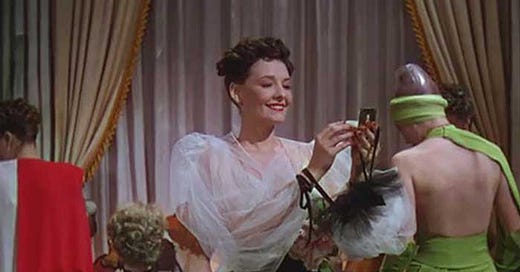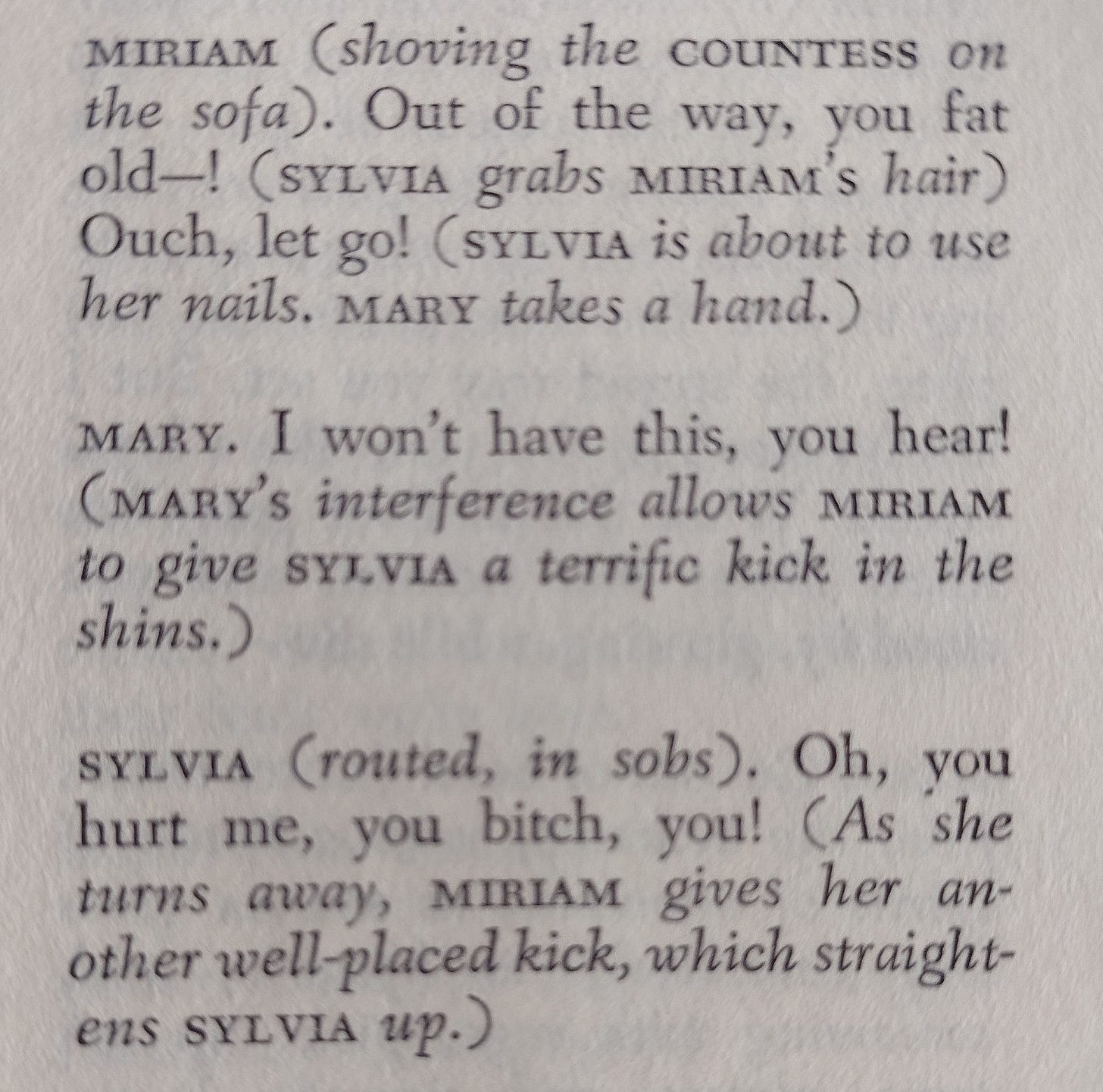Language lessons from "The Women" (1939)
Do you need to unswallow? And what the heck's a beazel, anyway?
I’ve probably seen The Women (1939) half a dozen times, including at least once on the big screen, but it was only during my most recent viewing that I paid attention to a couple of curious words in the screenplay.
If for some reason you’re unfamiliar with this version of The Women1, which was based on Clare Boothe Luce’s long-running Broadway play and which featured many of the era’s brightest stars (Norma Shearer, Joan Crawford, Rosalind Russell, Joan Fontaine, Paulette Goddard, Marjorie Main), here’s an overview: There are 130 speaking roles in the film, and all of them are played by women. All of the animals are female, too. (The director was a man, George Cukor.) The central drama involves Mary Haines (Shearer), who discovers that her husband, Stephen (always off-screen), has fallen prey to the avaricious sales clerk Crystal Allen (Crawford). Copious weeping, a trip to Reno, and a few twists ensue. In between there’s a giddily surrealistic fashion show — a Technicolor sequence inserted into the black-and-white movie — and a lot of rapid-fire dialogue, some of it scripted by Anita Loos (Gentlemen Prefer Blondes).

It’s that dialogue — and two words in particular — that I’m zeroing in on today.
Unswallow
What do you say when you’re feeling queasy but a) you’re a lady of a certain class in the 1930s and b) you’re in a movie subjected to the strictures of the Motion Picture Production Code? If you’re Edith Potter (Phyllis Povah) — perennially pregnant and nauseated by a plate of smoked oysters at a ladies’ lunch — you rush offscreen while saying over your shoulder, “Lay off my reputation, girls, while I unswallow.”2
Unswallow! So perfectly prim yet so vividly gastric. I’ve found no evidence of the upchuck sense of “unswallow” being in general circulation at the time of the movie’s production — or since, for that matter — but now I can’t unknow the word. It certainly fits comfortably into the current fad for un- words of all sorts.3 Let’s revive it!
Beazel, part 1
Beazel is how it’s spelled in the TCM captions; it appears as beezle in the script. And I’ve found a couple of other spellings for this intriguing word. But what does it mean?
In The Women, it’s used twice by the catty (or foul?) Mrs. Fowler (Rosalind Russell, in finest bitchy form), once to refer to homewrecker Crystal Allen and once to describe her own marital rival.
It turns out I’m not alone in having puzzled over beazel. It’s been a topic of discussion for decades.
A July 31, 1939, article in the Washington Evening Star, “That Catty Turn of Mind Gets a New Vocabulary,” asserts that beezle and similar terms were “born of the Hays’ office [i.e., the Production Code] limitation on the language that may be used in motion pictures. Any one who saw the stage version of ‘The Women’ will have no difficulty recalling a number of words that would seem strange and startling on a movie sound track. The fact of their good old Anglo-Saxon standing could get them nowhere in Hollywood. They were banned and that was that.”
I tried (and tried) to find a copy of the original theatrical script online, but managed to locate only a scrap of dialogue in a biography of Clare Boothe Luce: When Sylvia Fowler shares the dishy gossip with Edith Potter, she sputters that Stephen Haines has dishonored his marriage with “a blonde floosie [sic].” In the film, however, the line comes out this way: “It wouldn’t be so bad if Stephen had picked somebody from his own class. But a beazel!”
UPDATE: On Bluesky, librarian Aimee Gee reported that she’d located the script of the play and identified the words that had bee replaced by “beazel”: trollop and bitch!
END UPDATE.
Later in the film, when the ladies reconvene in Reno to finalize their divorces, Sylvia complains that her own husband has “kicked me out — kicked me out — for some filthy beazel!” I don’t know what the equivalent word was on the stage — bitch? tramp? (Luce did get away with “morning sickness” and “virgin” in her script, two words that were completely verboten in Hollywood movies for decades.)
Beazel, part 2
But there’s abundant evidence that not only was “beazel” not invented for the 1939 movie, it had in fact been in circulation for nearly 20 years by the time Cukor & Co. hit the soundstage.
In 2019, Mark Maynard investigated “The Etymology of ‘Beazel’” and found the word in a “flapper dictionary” published in the Logansport (Indiana) Pharos-Tribune4 on April 22, 1922. A beasel was “a flapper slightly more advanced than a Barlow” — or, writes Maynard, “a more experienced flapper.” (What was a Barlow? “A flapper or a spring chicken.”) A fellow who pursued beasels was, of course, a beasel hound. And a bell polisher was “a Beasel Hound who likes to linger in the vestibule at 1 a.m.”)

Savvy screenwriter Anita Loos would almost certainly have been aware of the 1920s sense of beazel/beasel, which was old-fashioned by the time The Women went into production. Could she have appropriated it as a euphemistic portmanteau of, say, bitch and weasel? Maybe!
Beazel, part 3
But hang on just a minute. Let’s check the authoritative sources!
’s Green’s Dictionary of Slang gives this definition of beasel: “a young woman, with overtones of sexual precocity; thus beasel hound n., a man who pursues such girls.” Green’s earliest reference is the April 28, 1922, issue of the Appleton (Wisconsin?) Post-Crescent, which probably picked it up from the Logansport paper. Origin of the term? Unknown. Maybe besom, which I think means a broom. Huh? A broom?The Random House Historical Dictionary of American Slang goes in an entirely different direction: Beazle (orig. unkn). Student slang for “a worthless fellow.” Earliest citation: 1931.
Are we confuzled yet?
Beazel, part 4
The Women isn’t the only movie that incorporated beazel into dialogue. The word also appears in Preston Sturges’s Sullivan’s Travels (1941) — another terrific film5 I’ve seen multiple times without clocking the use of beazel. Mark Maynard jogged my memory:
For those of you familiar with the film, this exchange takes place as Burrows (Robert Greig), the butler, drops off his employer, film director John L. Sullivan (Joel McCrea), and his companion (Veronica Lake), at a Los Angeles hobo camp so that they might be able to hop a train east.
SULLIVAN TO THE GIRL (WHO IS DRESSED LIKE A BOY): You look about as much like a boy as Mae West.
THE GIRL: All right, they’ll think I’m your frail.
BURROWS: I believe it’s called a “beazel,” miss, if memory serves.
The humor comes, of course, from the very proper Burrows employing a louche slang term. But what’s the meaning of beazel? Is it a synonym for “frail” — 19th-century slang for “prostitute” or simply “woman” (or, perhaps more accurately, “broad”)?
Maynard summarizes:
So, Veronica Lake, in Sullivan’s Travels, dresses like a boy in hopes of avoiding suspicion while hopping freight trains with her new-found director friend, gets told that her disguise isn’t working, responds by pretty much saying, “So, they’ll think I’m an innocent, non-sexual, androgynous girl,” only to essentially be told by the butler, “No, it’s pretty clear that you’re an independent, sexual, modern woman who knows exactly what she’s doing.” At least that’s my reading of things. [So, she’s not as naive as a barlow, and not as sexually experienced as a biscuit, but somewhere in between.]
I think that’s a misreading of “frail,” but who knows? If you have a better suggestion, leave a comment.
And I’ll leave you with my non-beazel candidate for best line in The Women: “Our new one-piece lace foundation garment. Zips up the back and no bones!”
There was a 2008 remake, starring Meg Ryan, that currently has a 13 percent rating on Rotten Tomatoes.
The Women managed to sneak the taboo “nuts” into the ladies’-lunch scene, rendering it as both an interjection and a question.
I wrote about the un- trend earlier this year (gift link).
They just don’t name newspapers like that anymore.
And the source of the title of the Coen brothers’ 2000 film O Brother, Where Art Thou?









This will be the most valuable thing I'll read today!
I think the Flapper Dictionary (to which I may have been alerted by friend and colleague-in-slang Tom Dalzell) was a big hit across the small-town press in 1922 and thus it's hard to settle on the original publication. I found it all over the place. I wrote about it and other aspects of the flapper lexis in my Sounds and Furies (2019), a failed but i hope fun attempt to trace a parallel world of woman-coined slang.